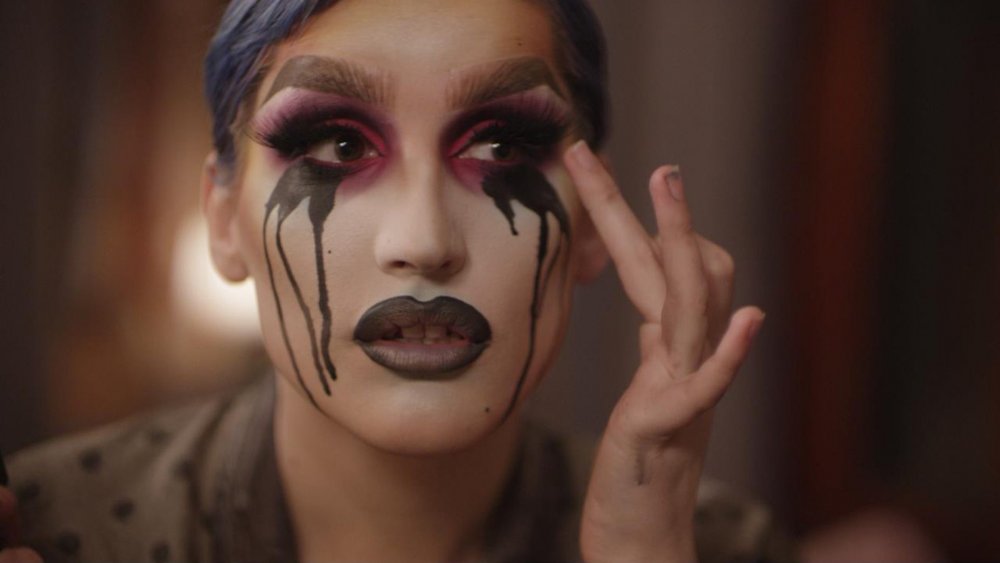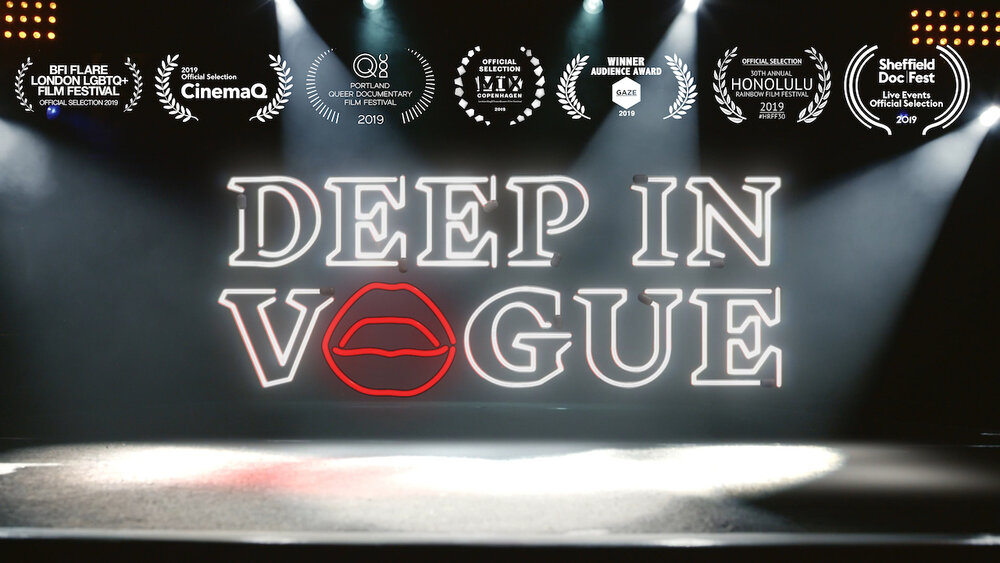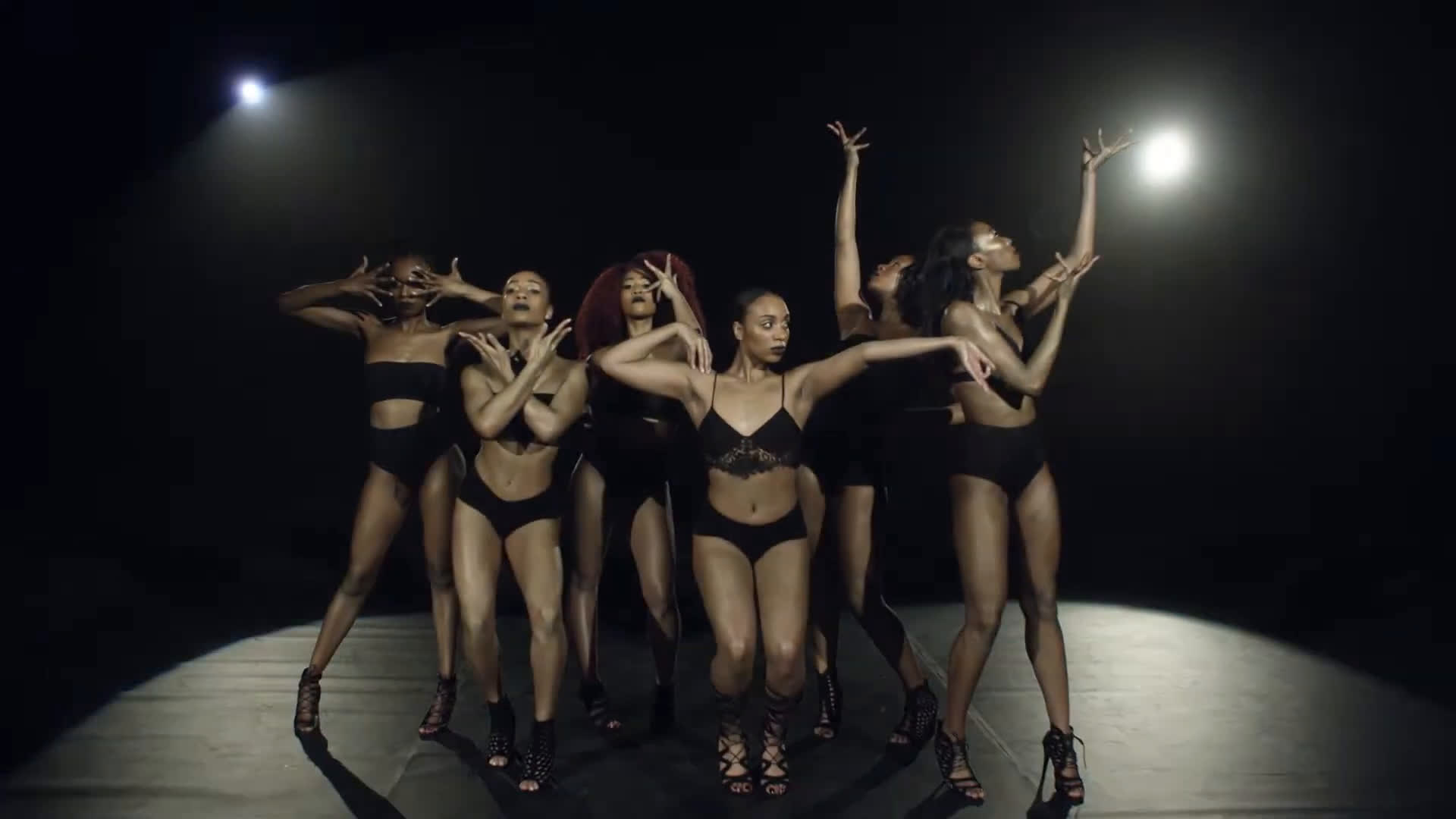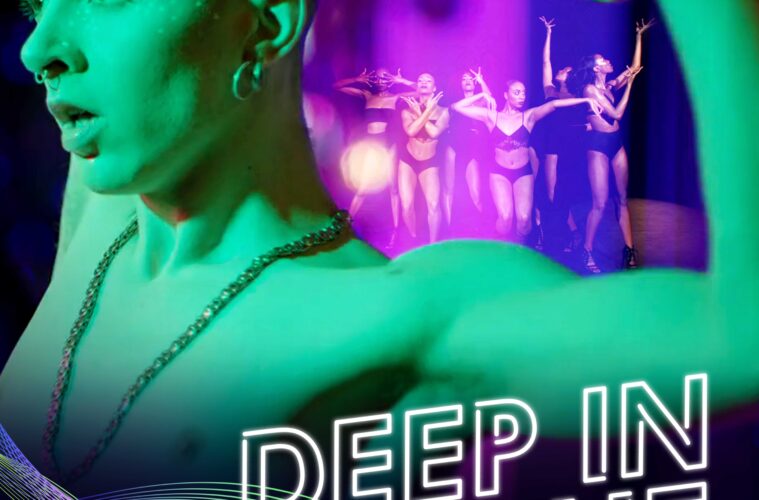Now that great productions on ballroom culture and voguing, such as Pose, have reached the mainstream conversation, this Pride Month is the right time to also check out the history and current manifestation of ballroom culture in other regions. Deep in Vogue illustrates the present reality of voguing and ballrooms in the North of England, with a focus on their origins, and on the political significance voguing’s migration from 1980s New York to Manchester today. We had the opportunity to chat with one of the film’s creators and co-director, Amy Watson, who spoke about crafting a thoughtful documentary film on queerness, the purpose of the film and her hopes for the queer and marginalized communities in England.
You can now watch the film for free in CBC Gem.

Grace Oni Smith in Deep in Vogue.
Deep In Vogue was co-directed by first-time documentary film directors Amy Watson and Dennis Keighron-Foster, whose admiration for the Manchester Ball compelled them to create this exploration of the meaning of voguing, houses, and ballroom culture for both queer and non-queer people from Manchester.
In Deep in Vogue, the Houses’ Mothers guide us through these spaces, telling us their experiences and introducing us to their chosen families. Ultimately, this depiction is about very driven yet different individuals coming together, embracing their differences and crafting something with great passion and love for art.
The film emphasizes the relevance that spaces of reunion had for queer people and how this has evolved to a community that now also encompasses people beyond queerness, with everyone embracing queer culture and history to enjoy what now is just ‘culture’ to them all. Moreover, it is still very aware and respectful by recognizing its roots in Black and Latino queer communities in the United States, thus becoming what could be the modern British response to Paris is Burning.
Watch our interview with Amy Watson here, or read the transcript below.
What initially drew you to the subject matter, as your first documentary ever to direct?
Oh, lots of things really. So I was working in advertising in like women’s fashion advertising. A lot of what I was making, I realized just made people feel bad, you know, it’s all about making women feel like they’re not thin enough, they’re not pretty enough, that’s what sells the products and so I was really kind of destroying my soul, so I wanted to do something that was the opposite of that, and create something that made people feel good like no matter who they were. And me and Dennis –my co-director– we’ve been going to the balls in Manchester for a few years, and it just felt like the most joyous, spiritual, accepting, exciting space that you know I’ve ever been in. Our whole intention when making the film was to write a love letter to all the people who made that happen. And all the people who created that space because it was our favourite. So yeah it was the antidote to my other work, but also, we just thought everyone needed to know about what was happening in Manchester, because also no one knew, very few people even in the queer scene in Manchester knew that that was about all that, so we also wanted to promote it.
Can you tell us more about the time you spent with the Houses and Mothers?
I think a lot of the people in the documentary had been approached before about making a documentary, and you know it either came to nothing, or nothing had been given back to the community and they never heard of the documentary-makers again. And so, they’re all a little bit kind of shy of getting involved with the film crew which I totally understand. But luckily my friend Jean Paul went to school with the Mother of the House of Ghetto, Darrin Pritchard. And so he called up Darren and said “Look, these guys aren’t arseholes. Can you at least talk to them?” And so we talked to Darren on Jean Paul’s recommendation. And he sat down with us, had an initial chat, and said, “Okay, you don’t seem like arseholes. Let’s, let’s work together” and we’re really keen on not doing that thing of like you know just filming people, not including them in the process, not letting them choose how they were portrayed or, just kind of like othering people that were being filmed. So Darren became our kind of advisor, an executive producer on the film and it was all about his say so in the final cut, were we telling the right story? He directed us in ways and away from things that he thought we shouldn’t touch, and so it was made in kind of tandem with the people who were in the documentary. I mean not everyone because there’s lots of people in the documentary, but, you know, the gatekeepers– Darren. He really kind of helped mould it with us and for us. And yeah, we all became friends. It was really nice!
How did you feel while standing behind the camera and recording these stories and this reality that you previously knew?
Me and Dennis, we didn’t really know what we were doing, or we didn’t know what we were making, we never made anything before, you know, apart from music videos and little things for friends’ bands and stuff so we didn’t have any expectations of what we would come up with, and we kind of thought it would be a big mess. But then, once we started showing it at film festivals, people actually liked it. The fact that it’s you know going out on Canadian TV is just surreal, and huge for us because it’s nowhere near what we thought would happen when we were kind of desperately trying to figure out how to get equipment, how to get the day off work to do some filming, and then you know dance is the flakiest part so it’d be kind of waiting outside people’s apartments, waiting outside dance studios, did we get the time right? Are these people are gonna turn up? And the fact that it’s all come together into something that people want to watch is really, really cool.
What was the most important thing you learned while filmmaking?
We learned a lot making this film. I think we went into it really naively, thinking that it would be easy, that no one would have a problem with it and we learned a lot. It was a different film at one point. We went down to London and filmed a lot of the more kind of rootsy original Houses who came from the original New York ballrooms, so the House of Revlon and things like that. And we had to cut all that footage because they came back to us and they were like, “You guys shouldn’t be making this film like you’re white, middle-class people, and you’ve got no place making a film about a historically Black and Hispanic dance culture” and we had to really kind of go, “Whoa, okay, this is real, and we need to really think about this and question who we are us making this film.” And so it’s, you know, it was very different in London than it was in Manchester, I think, because it’s just, culturally, a different place. We also learned a lot about, like, all of these secret parts of filmmaking that we had no idea about like the legal side and the insurance side, and things that we didn’t expect to be our biggest cost like buying hard drives. All of our money went on buying hard drives, because we were just like recording and recording and running out of space and storage and so like, behind me there’s a wardrobe, it’s just full of hard drives. Yeah, we learned a lot about filmmaking and white privilege and culture and, yeah, it was a big four years.
Talking about the Houses and the history of Manchester’s voguing scene, what did you learn?
I suppose is really interesting how vogue came to Manchester, and how it has kind of come about from this 1980s New York dance phenomenon, like how does it swim across the say turn up in Manchester in 2017. You know, and the kind of seeing the story of that and the parallels between then and now. And, you know, it’s kind of Reagan, AIDS, New York, transphobia, all of that, racism, the things that vogue was born out of, originally. Why has it turned up in Manchester? And it’s incredibly racist, conservative government, homophobia, Brexit, all of this kind of very right-wing kind of pressure on others, ‘the other’. It bubbles up in these interesting, creative, exciting ways and so you can see why we need Vogue in the same way that young Black teenagers in 80s New York did. It’s this pressure from the right-wing and hate crimes are on the rise in the UK with Brexit. Homophobia is on the rise. The government’s constantly enacting racist policies that target minorities, it’s, it’s kind of, how would vogue not exist now in Manchester, so it was interesting seeing that kind of time warp happen.

Considering the importance of voguing and ballrooms in queer culture and history, how does it feel to be able to teach this through the film?
Um, scary? (Giggles). You know, who are we to say anything about a culture that isn’t ours, but we just wanted to show something that we saw happening in our community, and we saw it as this really positive, holy, like positive almost spiritual force in our community and we were like, “People need to know about this, they need to know that they can get some of this, and that it’s healthy and needed and exciting, and just kind of necessary”, so yeah it feels good to be helping spread that culture. But also, like, you know, it comes from such a deep and historic place it also feels like quite scary in terms of, who are we to be showcasing this. So yeah, the Ying and the Yang.
As you asked yourself in the documentary, what do you think is the political relevance and role of voguing?
It’s the fact that we’ve got this lean to the right in our government and our policies and the people who that puts pressure on, you know, minorities, gay people, trans people, all that pressure is on them and it comes out, that reaction comes through in beautiful ways. And so it’s in some ways it’s great that [vogue] exists, in some ways, it’s like why is this ghettoize into ‘queer culture’, this should just be culture, you know, like for everyone. I think Darren Suarez, the organizer of the ball, says “We’re in a silos, why is this just queer culture?”
What did acceptance mean to you in such a welcoming community as the one we see in the film?
Everyone’s just so nice and cool and clever and creative and I’m just like letting us hang out with them with a camera for a bit, just felt like such an honour, really. It was just so nice to kind of warm our hands on that flame. So yeah, it was lovely.

We see a hopeful ending about belonging and finding your place. What was your aim by ending the film this way?
I think it comes from something Grace Only Smith says in the film. She talks about growing up trans in rural Cumbria, which is like this kind of sheep farming area, in the north of the UK, and how just alone and crushed she felt at that age, and that if she, you know if she’d have had access to Paris is Burning earlier, or if she’d seen that one town away, all of her future best friends were up on stage and sequence, being their best selves like it would have been such a comfort. And so, I think queer kids these days are so much more kind of like plugged into the fact that there’s this huge community of amazing people for them to go and hang out with, once they leave their rural towns, but just kind of like helping spread that message of like you know, they’re we’re all out there, we’re all out here waiting for you to leave your teenage bedroom, and come and hang out with us. So, yeah, that was, that was the message we wanted to leave and that was Grace’s message.
How would you invite people to watch it now that it’s up on CBC?
Please come and watch our documentary, we have nothing but good intentions. Yeah, get that little slice of positivity in queer culture because– I don’t remember who said this to me recently, but lots of queer films and lots of documentaries, it’s always a story of pain and it’s always a story of, kind of, you come through this horrible thing and you know I guess that’s a lot of drama, but we wanted to present an alternative kind of positive, you know, it’s not all bad, there’s some real joy and success stories and people lift each other up, and it’s just great.


